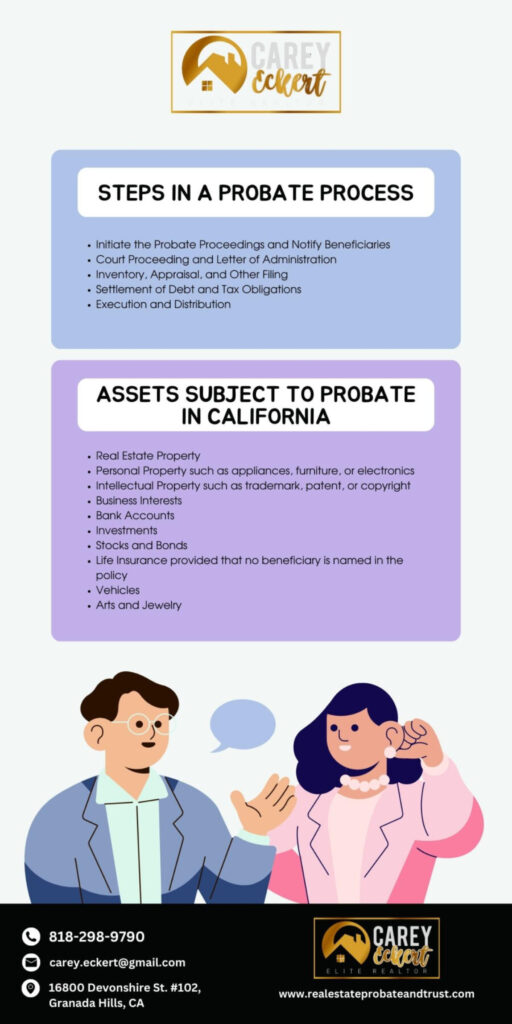Losing a loved one is a traumatic event. It can be painful emotionally, and the healing process may be lengthy.
Aside from the emotional toll of losing a loved one, there are also critical administrative tasks to settle. These may include funeral preparations, notifying family and friends, and managing legal affairs such as estates, wills, and probate.
A deceased individual’s estate must undergo a legal procedure known as probate. It is a legal process initiated upon the passing of an individual who has left behind assets to distribute. It may include financial assets, bank accounts, and real estate.
Probate refers to the legal process of managing the assets and affairs of a deceased individual, either in accordance with their Will or in the absence of a will.
The probate process in California can be particularly intricate. The state has some of the most comprehensive probate laws in the United States.
Probate can take several months to complete and can be expensive due to the court fees and attorney costs involved.
However, someone must first submit a probate petition in order for the probate proceeding to initiate.
It is important to consult with an experienced probate agent in California to navigate this process smoothly and avoid any legal complications.
This article will provide insights into the essential things you should know about probate in California. From the roles of the parties involved and the timeline of filing to the statutory costs and additional fees that you may encounter throughout the process, we got you covered.
When Probate is Necessary

Credit: Image by StockSnap | Pixabay
The rules governing probate and whether it is necessary following the decedent’s passing vary by state. Probate is required in some states if the value of an estate exceeds a certain threshold.
In California, it is mandatory to undergo the probate process if the estate’s value exceeds $184,500.
Please note that in some instances, probate may be necessary despite the estate’s value falling below the threshold.
For example, an insurance or title company requires substantiation of property ownership. They may file a petition for a probate process to obtain such legal proof even if the estate value did not exceed the required threshold of $184,500.
If an estate meets the criteria for exemption from the probate process, it may be possible to pursue alternative legal measures. It includes the submission of an affidavit to claim the assets of said estate.
If the decedent did not possess any assets for transfer or the deceased person’s debts outweigh their assets, initiating probate proceedings is typically unnecessary.
Probate Process in Southern California

Credit: Image by OleksandrPidvalnyi | Pixabay
California has a streamlined probate process that consists of the following steps:
Initiate the Probate Proceedings and Notify Beneficiaries
A probate petition must be filed with the Superior Court where the decedent resided at the time of their death. An estate representative is also usually appointed at this time. If there is a will, the petition must include a copy of the original.
In the case of a valid will, the individual designated as the executor will act as the estate representative. Otherwise, a court-appointed administrator will take over and handle the estate.
Note that the following individuals are not eligible to serve as estate representatives to avoid a conflict of interest.
- A Minor
- A Non-US Resident (unless that person is specifically named executor in the Will).
- Someone who is under conservatorship or unable to carry out administrative responsibilities.
Publication in the local newspaper is mandatory after the estate representative has submitted the probate petition. Its purpose is to alert beneficiaries and possible creditors of the upcoming probate process.
Court Proceeding and Letter of Administration
Once probate is established, a series of court proceedings will take place to ensure that everything is in place. Many things must be checked off the list, including whether or not the required notification was sent and who the deceased’s heirs are.
After the hearing, the court will issue the letters testamentary. It serves as authorization for the estate representative to take action on behalf of the estate, such as safeguarding the decedent’s property and assets.
Inventory, Appraisal, and Other Filing
Once the letter of administration is issued, the estate representative will have to create an inventory of the deceased’s estate subject to probate.
Note that not all assets owned by the decedent may require probate administration. An example would be a life insurance contract with a designated beneficiary.
In addition to identifying assets, it is also important to identify any outstanding debts. Once the estate representative has accurately inventoried the assets, an independent assessor will appraise the value of each asset in the list.
Settlement of Debt and Tax Obligations
All legally binding debts must be settled before the decedent’s assets are distributed to its beneficiaries. Creditors must file their claims on a probate estate within four months.
Once the creditor has submitted their claim to the court, the estate representative will proceed to either pay off the debt or dispute the claim.
Aside from debts, the estate representative must pay all applicable taxes on time.
Execution and Distribution
Once all outstanding debts and taxes of the estate have been settled, the estate representative will submit a formal petition to the court to initiate the probate closure process.
The petition consists of a comprehensive record of all estate-related undertakings. It also presents a breakdown of the compensation, if applicable, to the estate representative or attorney.
Once the court approves the accounting without any objections, an order is issued to conclude the probate.
At this point, all remaining assets are distributed to the beneficiaries.
Probate Fees and Costs

Credit: Image by stevepb | Pixabay
Probate costs in California are among the highest in the United States.
The California Probate Code 10800 outlines the basis of how much probate attorney fees and executor commissions will cost.
These are based on the gross value of the probate estate multiplied by the applicable probate fee percentage. You may use the full Probate Fees Chart below as a guide.
Keep in mind that in determining the value of an estate in California, the court looks only at the value of the assets subject to probate and does not factor in any outstanding obligations of the estate.
| Probate Fee Percentage | Gross Value of Probate Estate |
|---|---|
| 4% on the first | $100,000 |
| 3% on the next | $100,000 |
| 2% on the next | $800,000 |
| 1% on the next | $9 million |
| 0.5% on the next | $15 million |
| Above $25 million | Court will decide |
Fees involved in probate extend beyond the statutory probate fees. Here are other probate costs that you might encounter in probate:
| Particulars | Cost |
|---|---|
| Filing fee for petition of letters of administration or testamentary | $435 |
| Final distribution fee | $435 |
| Search for estate document that are longer than 10 minutes | $15 |
| Delivery of will to the court where the estate will be administered | $50 |
Timeline for Probate in Southern California

Credit: Image by Darkmoon_Art | Pixabay
The Probate Code of California sets out timelines and deadlines in the probate process.
Probates in California must be filed within 30 days after the deceased’s passing if an Executor was named in the Will.
Meanwhile, the deadline for filing an affidavit for a small estate is 40 days from the decedent’s death date.
These timelines and deadlines are essential to ensure the estate is distributed properly and efficiently.
Role of the Executor

Credit: Image by IqbalStock | Pixabay
An individual named in a Will as Executor is responsible for settling the decedent’s financial affairs and distributing the remaining assets to each beneficiary. Executors oversee the deceased’s estate in conformity with the wishes expressed in the Will.
The executor’s responsibilities are multifaceted and vary with the terms of the Will. Some of the most common duties of Executors are as follows:
- Obtaining and reviewing the decedent’s Will.
- Having the Will reviewed by the court to determine its validity.
- Identifying and notifying potential heirs and beneficiaries.
- Appraising and taking inventory of the deceased’s possessions.
- Identifying debtors, evaluating claims, and settlement of liabilities.
- Payment of any federal and state inheritance tax obligations
- Closing the estate and submitting the final accounting to the court
- Distribution of remaining assets to heirs and beneficiaries.
Types of Assets in Probate

Credit: Image by ArtisticOperations | Pixabay
Probate is required for any property under the deceased person’s sole name, is not payable on death, has no beneficiary declarations, or is not in a Living Trust.
Here are the typical assets subject to probate in California:
- Real Estate Property
- Personal Property such as appliances, furniture, or electronics
- Intellectual Property such as trademark, patent, or copyright
- Business Interests
- Bank Accounts
- Investments
- Stocks and Bonds
- Life Insurance provided that no beneficiary is named in the policy
- Vehicles
- Arts and Jewelry
Creditors and Debts in Probate

Credit: Image by StartupStockPhotos | Pixabay
Credit card bills, mortgage and auto payments, insurance premiums, property taxes, utility bills, medical and funeral costs, and any other debts incurred legally but not yet paid are all examples of outstanding debts.
When someone passes away, creditors may look to their estate or trust to settle any remaining debts. Similarly, if a beneficiary has outstanding obligations, the trustee or executor/administrator may be permitted to use the allocation to pay off the debt.
Different states have different deadlines for creditors to submit claims during probate. In California, time is of the essence after a debtor’s death.
Creditors only have one year from the decedent’s date of death to initiate a creditor claim. After this date, you can no longer exercise your claim to a lien.
If the debt is not contested, the estate representative will settle the amount out of the estate’s funds, paying the creditor in full.
Estate Taxes in Southern California

Credit: Image by RazorMax | Pixabay
California does not impose an estate tax on any estates, regardless of the size of the total estate value.
However, even if the estate is free from California’s estate tax, it might still be required to pay federal estate tax.
Federal Estate Tax
Any estate worth above $12.92 million is subject to the federal estate tax. We have provided a detailed chart of the federal tax rates and a sample scenario to understand federal taxes better.
| TAXABLE ESTATE* | BASE TAX TO BE PAID | MARGINAL RATE | RATE THRESHOLD |
|---|---|---|---|
| $1 – $10,000 | $0 | 18% | $1 |
| $10,000 – $20,000 | $1,800 | 20% | $10,000 |
| $20,000 – $40,000 | $3,800 | 22% | $20,000 |
| $40,000 – $60,000 | $8,200 | 24% | $40,000 |
| $60,000 – $80,000 | $13,000 | 26% | $60,000 |
| $80,000 – $100,000 | $18,200 | 28% | $80,000 |
| $100,000 – $150,000 | $23,800 | 30% | $100,000 |
| $150,000 – $250,000 | $38,800 | 32% | $150,000 |
| $250,000 – $500,000 | $70,800 | 34% | $250,000 |
| $500,000 – $750,000 | $155,800 | 37% | $500,000 |
| $750,000 – $1 million | $248,300 | 39% | $750,000 |
| Over $1 million | $345,800 | 40% | $1 million |
*The taxable estate is the amount that exceeds the $12.92 million exemption.
Sample Scenario:
- Total Estate Value: $13.75 million
- Civil Status: Not married
To get your taxable estate, subtract the estate exemption threshold of $12.92 million from your total estate value of $13.75 million, which results in $830,000. Once you have obtained your taxable estate, you may now refer to the table to determine your bracket.
The difference of $830,000, which is your taxable estate, falls within the $750,000 to $1 million bracket. Based on the table, your base payment on the first $750,000 will be $248,300.
The amount in excess of your taxable estate of $830,000 and the rate threshold of $750,000, amounting to $80,000, is subject to 39% marginal tax. It creates an additional tax burden of $31,200.
Your total federal estate tax payable is $279,500, derived by adding your base tax payable of $248,300 and the additional marginal tax of $31,200.

Wrap Up
Probate is a legal process initiated upon the passing of an individual who has left behind assets to distribute.
In California, it is mandatory to undergo the process if the estate’s value exceeds $184,500.
The probate process consists of filing a petition with the Superior Court, appointing an estate representative, publicizing the petition in the local newspaper, and a series of court proceedings.
It also includes an inventory of the deceased’s estate, payment of debts, and ultimately the distribution of the remaining estate to beneficiaries.
It is truly a hard time when a loved one passes. Aside from emotional difficulties, administrative matters also need to be taken care of, and we would like to help.
Let us assist you with any legal matters concerning the estate and probates in California. Our team can provide guidance on estate planning, probate, and other related legal issues.
If you want to book an appointment, you can reach me at 818-298-9790. You can also message me at carey.eckert@gmail.com or follow me on my social media accounts below.

Credit: Image by Pixabay | Pexels
Frequently Asked Questions
When is probate required in Southern California?
In Southern California, all estates valued at more than $184,500 must go through the probate process.
What happens if you don't file a probate in Southern California?
The estate will be frozen, and the beneficiaries cannot access any of the assets until the legal process is complete. It will also incur late fees and penalties, which can add up quickly and make paying off any existing debt even more challenging.
What is probate in Southern California?
A probate is a legally binding procedure that the court supervises. Its purpose is to validate the Will if one exists, and to appoint an executor who will oversee the settlement of the estate.
How long do you have to file a probate after death in Southern California?
A petition must be submitted before the probate process may begin. Therefore, the Petition for Probate must be filed promptly by someone.
The California Probate Code outlines a few different timetables and cutoff points. If an Executor was designated in the Will, they must request probate within 30 days after the decedent’s passing.
On the other hand, a small estate affidavit must be filed no sooner than 40 days following the decedent’s date of death.
How to avoid probate in Southern California?
Each state has unique methods for avoiding probate. Here are some ways you can do to avoid probate in Southern California.
- Establish a Living Trust
- Set Up a Joint Ownership with a Right of Survivorship
- Payable-on-Death and Transfer-of-Death Provisions
How long does probate take in Southern California?
The probate process usually takes at least 9 to 18 months.
How much does probate cost in Southern California?
The following are the statutory probate costs in California, calculated from the total value of the estate:
- 4% on the first $100,000
- 3% on the next $100,000
- 2% on the next $800,000
- 1% on the next $9,000,000
- 0.5% on the next $15,000,000
Above $25,000,000, the court will establish an appropriate amount of compensation.
How does probate work in Southern California?
In a probate case, the court appoints an executor (if a Will exists) or an administrator (if a Will does not exist) to serve as the personal representative.
The personal representative is responsible for gathering the assets, settling the debts and expenses, and distributing the remaining estate to the rightful beneficiaries.
Throughout this process, the court provides oversight to ensure proper administration.



